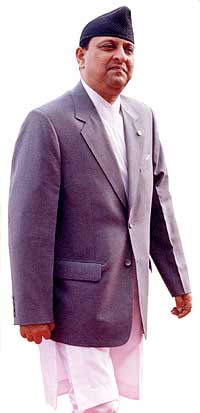 From the anger, banality, calumny and disdain that have gripped political deliberations, you can easily diagnose Nepal's immediate ailment: infectious ranting. Blame mainstream politicians for the ills of the last 12 years, and you're told how two wrongs cannot make a right. If the palace has violated the constitution, comes the refrain from the other end, it's because the politicos provided the pretext. A third wrong-the revival of the spirit of the defunct Article 128 of the constitution-is not going to help. Maybe a fourth-the restoration of the House of Representatives-would. Buried in this din is the real blunder our mainstream politicians made. When it eventually came down to contravening the constitution either way, how could have they expected the palace to step in at their convenience?
From the anger, banality, calumny and disdain that have gripped political deliberations, you can easily diagnose Nepal's immediate ailment: infectious ranting. Blame mainstream politicians for the ills of the last 12 years, and you're told how two wrongs cannot make a right. If the palace has violated the constitution, comes the refrain from the other end, it's because the politicos provided the pretext. A third wrong-the revival of the spirit of the defunct Article 128 of the constitution-is not going to help. Maybe a fourth-the restoration of the House of Representatives-would. Buried in this din is the real blunder our mainstream politicians made. When it eventually came down to contravening the constitution either way, how could have they expected the palace to step in at their convenience? 
A month later, Kangresis and comrades are still reminding us that the core of the 1990 compromise was the principle that the king can do no wrong. (The reactionary right obviously believes that should directly answer the critics.) The people are a step ahead. They realise the palace must have carefully weighed the consequences of its conduct. Royal advisers who had the acumen to insert two paragraphs from the satra sal proclamation into the 4 October address for added effect couldn't have ignored the rest of history.
Consider the situation from the other end. When the palace didn't have a direct political role these past 12 years, it still faced criticism. And, worse, for the wrong reasons. Nominations to the Upper House and ambassadorial appointments independent of the prime minister's recommendation warranted reproach. But the political class persisted with the generic "democracy-is-in-danger" chorus. Like some of the architects of the constitution say, the parties didn't criticise specific instances of royal infraction because they wanted to shield their own transgressions. If the palace has come centrestage with a readiness to take full responsibility for its actions, that doesn't sound like a bad bargain.
We know Prime Minister Lokendra Bahadur Chand and his ministers are answerable to no one but the king. The palace secretariat must have finalised a panchayat-style division of portfolios within the premises long before the king stepped in. Whatever goes on-and doesn't-in Singha Darbar will leave a lasting mark on Narayanhity. Mainstream parties can do much more than indulge in rhetorical flourishes over how the cushion between the monarchists and the Maoists has been ripped apart.
By refusing to join the Chand government, Kangresis and comrades have demonstrated how tainted leaders are still capable of upholding the torch of freedom. It's the arrogance of powerlessness that's troubling. True, most of the parties that welcomed the royal intervention have little more than telephone sets and tawny stationery to prove their presence. It's also true that big-party pride drove Baburam Bhattarai and his battalion into the jungle. They probably couldn't ever have won a parliamentary majority, but we were wrong to underestimate their ability to nullify those who could.
When newsrooms have more to fear from a fuming film industry than from finicky palace censors, it can only mean we're cruising in uncharted waters. The international environment is not conducive to a return to authoritarianism. Officially, it never was. (Remember how BP Koirala refused to believe he could be deposed in between King Mahendra's state visits to the United States and Britain and Queen Elizabeth's scheduled arrival in Kathmandu?) The super and regional powers that mattered were more willing to tolerate exceptions to the freedom-first rule. The war on terrorism has rewritten the post-Cold War rules to the detriment of our lives and liberties. This doesn't mean the free world is going to greet every tightening of the political screws with public displays of gratification.
In the end, it all boils down to the domestic front. And it's nice to see the debate simmering. What the constituent assembly Kangresis and comrades are toying with is not a bad idea, considering the sizeable number of Nepalis-Maoists and absolute monarchists-who feel excluded by this constitution. Not to mention that Chand and his deputy, Badri Prasad Mandal, represent parties that weren't even remotely involved in drawing up this statute. There's a lot we have to do in terms of the legal, political and procedural imponderables involved, though. We don't want to see another mob of malcontents go on the warpath just because of a technical flaw in the creation of such an assembly, do we?
While we work out those details, let's remain focused on an important feature of this constitution: the consecration of the jurisdiction of the street. Since political fortunes will continue to fluctuate with turbulence and tranquillity on the thoroughfares, I'll be keeping an eye on the New Road Gate-Indrachowk stretch.


